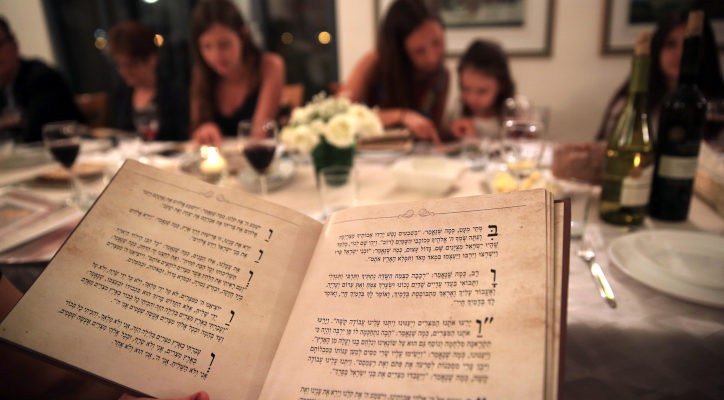Former Israeli ambassador to the U.S. Yoram Ettinger explains what the holiday of Passover is all about.
By Amb. (ret.) Yoram Ettinger, The Ettinger Report
– The Passover Exodus, in general, and the Mosaic legacy, in particular, inspired the US Founding Fathers’ rebellion against the monarchy, which evolved into a concept of non-revengeful, non-imperialistic and anti-monarchy liberty, limited (non-tyrannical) government, separation of powers among three co-equal branches of government and the Federalist system, in general.
The goal of Passover’s liberty was not the subjugation of the Egyptian people, but the defeat of the tyrannical Pharaoh and the veneration of liberty throughout the globe, including in Egypt.
– The Passover Exodus catapulted the Jewish people from spiritual and physical servitude in Egypt to liberty in the Land of Israel.
– The Passover Exodus highlights the Jubilee – which is commemorated every 50 years – as the Biblical foundation of the concept of liberty. The US Founding Fathers deemed it appropriate to engrave the essence of the Jubilee on the Liberty Bell in Philadelphia, Pennsylvania. Thus, the Liberty Bell was installed in 1751 upon the 50th anniversary of William Penn’s Charter of Privileges with the following inscription: “Proclaim liberty throughout all the land, unto all the inhabitants thereof (Leviticus, 25:10).”
Moses received the Torah – which includes 50 gates of wisdom – 50 days following the Exodus, as celebrated by the Shavou’ot/Pentecost Holiday, 50 days following Passover. Moreover, there are 50 States in the United States, whose Hebrew name is “The States of the Covenant” (Artzot Habreet -ארצות הברית).
– The Passover Exodus spurred the Abolitionist Movement and the human rights movement. For example, in 1850, Harriet Tubman, who was one of the leaders of the “Underground Railroad” – an Exodus of Afro-American slaves to freedom – was known as “Mama Moses.” Moreover, on December 11, 1964, upon accepting the Nobel Prize, Dr. Martin Luther King, Jr. said: “The Bible tells the thrilling story of how Moses stood in Pharaoh’s court centuries ago and cried, ‘Let my people go!’” Furthermore, Paul Robeson and Louis Armstrong leveraged the liberty theme of Passover through the lyrics: “When Israel was in Egypt’s land, let my people go! Oppressed so hard they could not stand, let my people go! Go down Moses, way down in Egypt’s land; tell old Pharaoh to let my people go….!”
– According to Heinrich Heine, the 19th century German poet, “Since the Exodus, freedom has always spoken with a Hebrew accent.”
– According to the late Prof. Yehudah Elitzur, one of Israel’s pioneers of Biblical research, the Exodus took place in the second half of the 15th century BCE, during the reign of Egypt’s Amenhotep II. Accordingly, the 40-year-national coalescing of the Jewish people – while wandering in the desert – took place when Egypt was ruled by Thutmose IV. Joshua conquered Canaan when Egypt was ruled by Amenhotep III and Amenhotep IV, who were preoccupied with domestic affairs to the extent that they refrained from expansionist ventures.
Moreover, letters which were discovered in Tel el Amarna, the capital city of ancient Egypt, documented that the 14th century BCE Pharaoh, Amenhotep IV, was informed by the rulers of Jerusalem, Samaria and other parts of Canaan, about a military offensive launched by the “Habirus” (Hebrews and other Semitic tribes), which corresponded to the timing of Joshua’s offensive against the same rulers. Amenhotep IV was a determined reformer, who introduced monotheism, possibly influenced by the ground-breaking and game-changing legacy of Moses and the Exodus.
– The annual celebration of the Passover legacy – with members of one’s family – underscores the Exodus, the Parting of the Sea, the Ten Commandments, the Covenant during the 40 years in the desert, and the reentry to the Land of Israel 3,600 years ago.
Passover aims at coalescing the fabrics of the Jewish family and the Jewish people, commemorating and strengthening Jewish roots, and refreshing and enhancing core values such as faith, humility, education, optimism, defiance of odds and can-do mentality, which are prerequisites to a free and vibrant society.
Passover is an annual reminder that liberty must not be taken for granted.
– Passover highlights the central role of women in Jewish history. For instance, Yocheved, Moses’ mother, hid Moses and then breastfed him at the palace of Pharaoh, posing as a nursemaid. Miriam, Moses’ older sister, was her brother’s keeper. Batyah, the daughter of Pharaoh, saved and adopted Moses (Numbers 2:1-10). Shifrah and Pou’ah, two Jewish midwives, risked their lives, sparing the lives of Jewish male babies, in violation of Pharaoh’s command (Numbers 1:15-19). Tziporah, a daughter of Jethro and Moses’ wife, saved the life of Moses and set him back on the Jewish course (Numbers, 4:24-27).
They followed in the footsteps of Sarah, Rebecca, Leah and Rachel, the Matriarchs (who engineered, in many respects, the roadmap of the Patriarchs), and inspired future leaders such as Deborah (the Prophetess, Judge and military commander), Hannah (Samuel’s mother), Yael (who killed Sisera, the Canaanite General) and Queen Esther, the heroine of Purim and one of the seven Biblical Jewish Prophetesses (Sarah, Miriam, Deborah, Hannah, Abigail, Huldah and Esther).
– Passover is the first of the three Jewish pilgrimages to Jerusalem, followed by Shavou’ot (Pentecost), which commemorates the receipt of the Ten Commandments, and Sukkot (Feast of Tabernacles), which was named after Sukkota – the first stop in the Exodus.
– Jerusalem is mentioned three times in the annual story of Passover (Haggadah in Hebrew), which is concluded by the vow: “Next Year in the reconstructed Jerusalem!”
Jerusalem has been the exclusive capital of the Jewish people since King David established it as his capital, 3,000 years ago.




